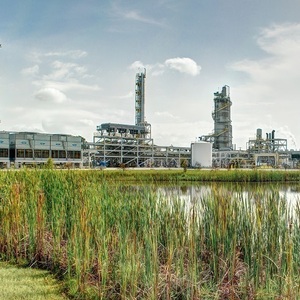Former Ineos Bio site purchased for conversion into eco-district

Ineos Bio
February 21, 2018
BY Erin Krueger
A consortium of investors and project developers led by Texas-based Frankens Energy recently purchased the former Ineos Bio Indian River Biorefinery in Vero Beach, Florida, and has announced plans to convert the site to an eco-district “harmoniously integrating a series of businesses, all focused on nurturing and supporting environmental sustainability, employment and education within the local community.” The projection of renewable fuels and electricity from biogas may be part of the planned eco-district in the future.
Ineos Bio broke ground on the Vero Beach demonstration plant in February 2011. The facility used a gasification fermentation process to convert cellulosic waste materials, such as yard and vegetative waste, into ethanol. In addition to having the capacity to produce 8 MMgy of ethanol, the plant could also produce up to 6 MW of electricity.
Construction was completed on the facility in 2012, and commissioning began in June of that year. The plant was producing renewable power by November 2012. In July 2013, Ineos Bio announced the plant was also producing cellulosic ethanol at commercial scale. A few months later, in December 2013, Ineos Bio released an operational update, noting the facility would require certain modifications and upgrades to build its on-stream performance and reliability.
Advertisement
Advertisement
In September 2014, the company announced a major turnaround had been completed at the facility, including technology upgrades, and that the plant was being brought back online. Improvements included the installation of equipment to remove impurities from one of the plant’s process streams, which had been negatively impacting operations. Around that time, a Florida Department of Environmental Protection, Division of Air Resource Management document had revealed the plant had produced little to no ethanol due to the production of low levels of hydrogen cyanide, which is toxic to the bio-organisms in the fermentation process. The installation of wet scrubbers to remove the hydrogen cyanide was expected to solve that problem.
Ineos Bio announced plans to sell its ethanol business, including the Vero Beach demonstration plant in September 2016. The company said the market for ethanol had changed and the economic drivers for its technology were no longer aligned with its strategic objectives.
In February 2017, Alliance Bioenergy Plus Inc. announced it had submitted an offer to purchase the Ineos Vero Beach site, with plans to retrofit the front end of the facility with its patented CTS process to convert yard waste into cellulosic ethanol.
A few months later, in July, Alliance announced it had received approval from the USDA to purchase the plant. That transaction, however, was not completed. Rather, the facility was purchased by Frankens Energy and its partners.
Advertisement
Advertisement
A statement issued by Frankens Energy on Feb. 21 notes that the former Ineos Bio site includes on-site power generation equipment and a physical interconnection to Florida’s electricity grid. “The site also benefits from substantial availability of land that can be used to operate a series of sustainable businesses, and it is also located adjacent to the Indian River landfill, which manages the emissions of its landfill waste gases that could one day be used productively as a renewable fuel to generate clean power for the local community,” said the company in a statement.
Over the course of this year, the new owners and development have indicated they will work with local and regional business operators, with plans to eventually generate utility-scale power from a solar photovoltaic farm, generate baseload energy from landfill gas, recycle local liquid effluents, recycle local and regional wood waste, and recycle cement to produce gravel and other road construction materials.
The company’s statement also mentions a 75 percent loss in local citrus crops due to insect infestation and associated greening. Frankens Energy said it wishes to explore initiatives that could enable the eco-district to support the farming community. “With this in mind, the team is holding discussions with various operators of ethanol plants as well as developers of alternative agricultural crops that could be used to produce biofuels, thereby providing farmers with a long-term local market for these alternative crops,” the company said in a statement. “In the coming months, the Frankens Energy team also plans to hold discussions with local and state government officials, to further assess how the various business and technological initiatives at the Indian River Eco-District could best be leveraged to support the ongoing growth and prosperity of Indian River County, and the state of Florida.”
Related Stories
The USDA significantly increased its estimate for 2025-’26 soybean oil use in biofuel production in its latest World Agricultural Supply and Demand Estimates report, released July 11. The outlook for soybean production was revised down.
The U.S. Energy Information Administration maintained its forecast for 2025 and 2026 biodiesel, renewable diesel and sustainable aviation fuel (SAF) production in its latest Short-Term Energy Outlook, released July 8.
XCF Global Inc. on July 10 shared its strategic plan to invest close to $1 billion in developing a network of SAF production facilities, expanding its U.S. footprint, and advancing its international growth strategy.
U.S. fuel ethanol capacity fell slightly in April, while biodiesel and renewable diesel capacity held steady, according to data released by the U.S. EIA on June 30. Feedstock consumption was down when compared to the previous month.
XCF Global Inc. on July 8 provided a production update on its flagship New Rise Reno facility, underscoring that the plant has successfully produced SAF, renewable diesel, and renewable naphtha during its initial ramp-up.
Upcoming Events










